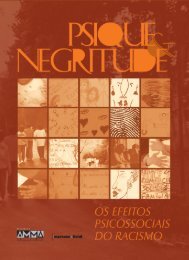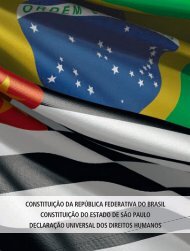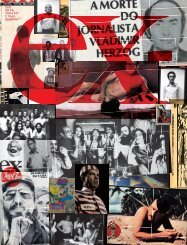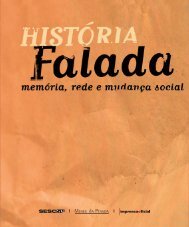CLÁSSICOS BRASILEIROS BRAZILIAN CLASSICS - Imprensa Oficial
CLÁSSICOS BRASILEIROS BRAZILIAN CLASSICS - Imprensa Oficial
CLÁSSICOS BRASILEIROS BRAZILIAN CLASSICS - Imprensa Oficial
You also want an ePaper? Increase the reach of your titles
YUMPU automatically turns print PDFs into web optimized ePapers that Google loves.
Brazilian Classics<br />
A selection of authors with works in public domain<br />
72<br />
JOSÉ DE ALENCAR<br />
(1829 – 1877)<br />
José de Alencar was the greatest prose writer<br />
in the Brazilian romanticism, and he is, even<br />
today, the most read fiction author in the<br />
country (Iracema, after 135 years, has having<br />
more than a hundred editions). Lived from<br />
1829 to 1877, he was characterized forever by<br />
determining the lines of force upon the Indianist<br />
novel, which, through the idealization of the<br />
native hero, the Amerind, brought about the<br />
valorization of a mythical origin eagerly accepted<br />
by the nation, as Brazil was in the middle of its<br />
national formation. The scope of Alencar's work,<br />
however, included also other elements; besides<br />
the indianist trilogy (Guarani, Iracema and<br />
Ubirajara), celebrating the unique roots of the<br />
Brazilian landscape and people, he described<br />
both the man and the life in the back country and<br />
remote settlements, feminine profiles, historical<br />
novels, and excellent psychological portraits<br />
of Rio de Janeiro's bourgeoisie. The writer left<br />
also an autobiographical essay, in which he<br />
approached his own work with great refinement<br />
and exemplary acuity.<br />
Review<br />
Main works<br />
Excerpt<br />
Iracema<br />
Andira, elder Andira, drank more blood during<br />
the war than all cauim ever drunk during Tupã<br />
parties by all the warriors who right now provide<br />
the light of his eyes. He saw more combats in<br />
the course of his life, than moons ever denuded<br />
his forehead. How many potiguara skull did<br />
his implacable hand scalped before time pulled<br />
out his first hair? And elder Andira was never<br />
afraid the enemy could step on his parents' land;<br />
but he took pleasure when they came, and felt<br />
youth being reborn in his decrepit body as he<br />
smelled the approach of war; just like the dried<br />
tree blossoms again with the blow of winter.<br />
Tabajara nation is careful. The hatchet must<br />
be retreated before the membi is played in the<br />
party. You may now, lrapuã, celebrate the arrival<br />
of the emboabas, and allow they all come near<br />
our fields. Then Andira promises you the victory<br />
banquet [...].<br />
"Future generations will call it a masterpiece"<br />
"Such is Mr. José de Alencar's book, fruit of his study and meditation, written with feeling and conscience. [...] This book<br />
will live: it embeds in itself the forces that not only withstand time, but also provide full bail for the future. [...] We call it a<br />
poem, without minding whether it is a legend, or a novel: the future generations will call it a masterpiece."<br />
(Machado de Assis, “José de Alencar: Iracema”)<br />
The first great flight of brazilian novel<br />
"It was bestowed upon José de Alencar, our greatest prose writer, to ensure our novel its first great literary flight."<br />
(José Guilherme Merquior, De Anchieta a Euclides)<br />
Cinco minutos (1857); O guarani (1857); A viuvinha (1857); Lucíola (1862); Iracema (1865); As minas de prata (1866);<br />
O gaúcho (1870); Guerra dos mascates (1870); O tronco do ipê (1872); Ubirajara (1874); Senhora (1875); O sertanejo<br />
(1875); Como e por que sou romancista (1893).









